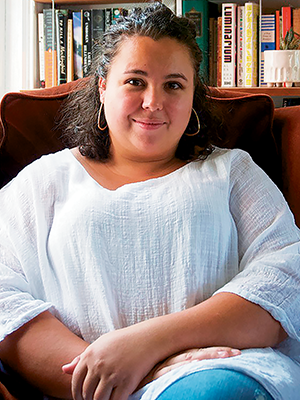To submit a question for the next featured agent, e-mail agentadvice@pw.org or write to Editor, Poets & Writers Magazine, 90 Broad Street, Suite 2100, New York, NY 10004. Questions accepted for publication may be edited for clarity and length.
Areas of interest: BIPOC, LGBTQ+, disabled, neurodivergent voices across all genres, especially upmarket/literary fiction, multigenerational sagas, magical realism, queer and non-Western horror, women’s fiction/romance, light fantasy, mystery, narrative nonfiction, essay collections, and middle-grade fiction
Representative clients: TJ Alexander, Remica Bingham-Risher, K. Tempest Bradford,
J K Chukwu, Katalina Gamarra, Beverly Gooden, Aline Mello
Looking for: In fiction, query letter in the body of an e-mail and first 50 pages attached as a Microsoft Word document; in nonfiction, query letter in the body of an e-mail and the full proposal attached as a Microsoft Word document
Preferred contact: larissa@jillgrinbergliterary.com
Agency contact:
Jill Grinberg Literary Management
392 Vanderbilt Avenue
Brooklyn, NY 11238
jillgrinbergliterary.com
I received five full manuscript requests from top agents after sending queries about my debut fiction manuscript starting in the summer of 2020. While I’m normally a patient person, this is how long I’ve been waiting for responses: 256 days, 254 days, 249 days, 240 days, 199 days. I’ve followed up with all five agents recently, and only two responded—both very busy, haven’t gotten to it yet. I understand things in traditional publishing are moving even slower than usual due to the pandemic, with agents working at home, no day care, and so on. However, I’m beginning to feel like I’m being ghosted by some or all of these agents at this point. Do I have reason for anxiety? Hope?
Adam from Chicago
I’m sorry to hear you’re in this situation. Unfortunately it does sound like you might be getting ghosted, which is understandably frustrating and anxiety-inducing—every full manuscript request deserves a response for the sake of closure. With that said I don’t think these agents have disappeared on you out of malice or intentional disrespect. It’s more likely that they’re overwhelmed, behind on submissions, have stuff going on in their personal lives, or are even a little ashamed of how long it’s been since they’ve been in touch and now they don’t know how to adequately address or apologize for their absence. Fortunately this level of ghosting is not the norm. You mentioned that these five agents are “top agents,” which begs the question: “Top,” according to what standards? If the answer is that they have thirty years of experience and a list stacked with New York Times best-selling authors, consider broadening your horizons and querying agents with all levels of experience. After all, even “top agents” had to start somewhere, and it may very well be a young, hungry agent building a list at a well-reputed agency who falls in love with your manuscript and scoops it up.
I am a published author with several nonfiction books with a small press and articles in national and international academic journals. I am currently working on a memoir, with about 150 pages written so far, and am wondering if I should contact an agent now with a proposal plus several chapters or if agents prefer to receive the full memoir at once.
William from Durham, North Carolina
For nonfiction a detailed proposal is critical, as it gives both agents and editors an understanding of not only your writing style, but also your platform, relevant experience, and how you envision your book fitting into—and standing out from—the current market. Sample chapters and a proposal are usually enough for authors to begin querying agents, but I cannot stress enough the importance of researching different agents’ submission requirements and tailoring your query accordingly as a sign of professionalism and respect rather than going with a uniform approach.
Should foreign writers who write in English but live abroad submit their work to a U.S.- or U.K.-based publishing house, or try their luck locally? Do agents in the United States take foreign writers seriously?
Sohbat from Bratislava, Slovakia
Of course—you can even try all three locations, if you’d like. Agent interest will depend on the quality of the writing, the agent’s passion for the book, and whether the book seems right for that country’s market, but in general we represent authors from all over the world.
I am putting an anthology of contemporary Serbian poetry together with sixty-five poets, approximately 350 pages in length. Do I need an agent to submit it to publishers, or can I send query letters directly?
Biljana from New Orleans
It depends on the publisher’s submission requirements, which are usually listed on their website. I recommend researching which publishers are looking for poetry and are open to unagented submissions, though I always encourage authors to try to secure representation to protect their interests and negotiate on their behalf, even if—and perhaps especially if—they get an offer from a publisher.
Are agents typically impressed by authors who have won a writing contest or two, or does that not really factor into the salability of any given proposal?
Steven from Los Angeles
Yes and no. It mostly depends on what genre you’re writing in (though I’m guessing you meant nonfiction, since you mentioned a proposal) and which writing contests you’ve won—for instance, a major national writing contest known for being highly competitive versus a local contest an agent may not have heard of before. In general, writing contests are one of those things that could help you insofar as showing your experience and commitment to writing, but it won’t necessarily count against you otherwise. I would consider your previous publications, media appearances, and platform to be more important when writing nonfiction, contest or no contest.










